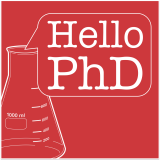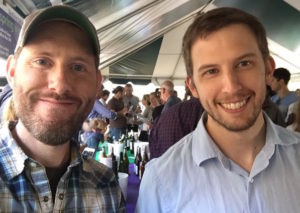 Think back to your grad school days. Think about a time when you were struggling with challenges either inside or outside the lab. Maybe you dealt with failed experiments, a toxic lab culture or mental health problems. For graduate students, these have been real, everyday experiences for as long as anyone can remember. The Hello PhD podcast, hosted by Joshua Hall and Daniel Arneman, aims to address those problems. We’re excited to announce that beginning with Episode 94 (released June 11, 2018), we are now partnering with Hello PhD to promote their mission to support young scientists in training.
Think back to your grad school days. Think about a time when you were struggling with challenges either inside or outside the lab. Maybe you dealt with failed experiments, a toxic lab culture or mental health problems. For graduate students, these have been real, everyday experiences for as long as anyone can remember. The Hello PhD podcast, hosted by Joshua Hall and Daniel Arneman, aims to address those problems. We’re excited to announce that beginning with Episode 94 (released June 11, 2018), we are now partnering with Hello PhD to promote their mission to support young scientists in training.
Hello PhD will be celebrating its third anniversary in July 2018, and in the past three years they’ve covered topics from grad school admissions to choosing a career path, and everything in between. They’ve interviewed post-docs, science communicators and students with interesting experiences to share. The most popular Hello PhD episode ever, “When Research Sucks,” discusses what to do when research starts to drag you down. After 94 episodes, they still haven’t lost sight of their mission to make the grad school experience better for both current and future students.
Josh and Dan told me that they first started discussing the idea of starting a podcast over dinner in 2013, but their story begins over a decade earlier in Chapel Hill. They met on an admissions interview weekend at the University of North Carolina – Chapel Hill. This was in 2002, when Josh was finishing up a Biology/Chemistry degree from the College of William and Mary and Dan was completing his biotechnology degree from the University of Kentucky.
After the interviews had wrapped up, Josh and Dan went out with a few other interviewees to grab a beer. Naturally, the conversation drifted to the struggles of graduate school admissions. Specifically, how do you know you’re picking the right school?
“I remember very distinctly…The topic that night was you [Josh] and one other student had both interviewed at some of the same schools,” Dan says, “And you were trying to compare those schools to UNC and debating about the merits of the two. That was like the first big decision of graduate school – where do you go to graduate school? And that’s what we hashed out at the bar.”

That initial conversation became a long-term friendship that continued to grow as they both worked through their studies at UNC. For the five and a half years it took to finish grad school, they regularly met to drink beer and lament the struggles of being a grad student. Relationships, PI issues, qualifying exams, failed experiments, research talks—Josh and Dan hashed out everything that graduate school threw at them.
After graduating, Josh set out on a path that eventually led to his current position as the Director of Science Outreach and Director of the Postbaccalaureate Research Education Program at UNC, where he helps post-baccalaureate students from under-represented groups make the transition to biomedical graduate programs. Dan worked for UNC in environmental analytics for a while before leaving academia to work for an energy efficiency software company.
“When we reflected back on our own experience in graduate school, it was a very common thing for us to do. Go out and share a beer and talk about what was going on.” -Joshua Hall
So, fast forward to that dinner in 2013. Josh and Dan were eating at a Brixx Pizza in the Chapel Hill area. It was a Monday night, which Josh remembers because they were enjoying a $2 beer special. By this point, they’ve been out of grad school for a while, but they’ve never stopped discussing the problems they’d noticed along the way—the flaws in the system.
“I was already in my current job where I work with grad students quite a bit, and other students who are interested in going to grad school,” Josh says. “Talking about the struggles they were having and, you know, we were just reflecting that a lot of the struggles students have today are the same ones that we dealt with back when we were in grad school. We had this idea – hey, it’d be really cool to do a podcast where we could just talk about some of these issues and maybe help students get through some of them.”
“The idea sprung up as a ‘Ha ha ha, that’s so funny that these issues are perennial,” Dan adds. “And ‘wouldn’t it be great if someone did something about it?’ So we sat down and we made a list, and we came up with 70 different topics that we thought were unique, individual things that we could address as part of the graduate training experience.”
Josh and Dan recognized that one of the biggest problems is that while the issues were ubiquitous, it can feel lonely, like you’re the only one struggling. There’s sometimes a lot of pressure in grad school to constantly perform at your best—keep your head up, blaze through obstacles without batting an eye, and, of course, never show weakness. In reality, everyone is struggling to some extent, and they saw their podcast as a way of breaking that stigma and starting an open conversation. Perhaps they could show struggling students that they weren’t, in fact, alone.
“Not to minimize their experience,” Dan says. “It just shouldn’t be isolating.
They were all fired up with their list of topics—until Dan lost the list.
“The list was on my phone, but then my phone broke. It took another few months to finally decide we were going to do this thing.”
They ended up stalling for two years between writing the ill-fated list and actually releasing the first episode. Most of that time was spent in limbo—they knew they had a good idea, but it was still abstract. Eventually, after a year and a half, they realized that their podcast was more than a cool idea. It was a much-needed outlet for helping thousands of young scientists.
“Just knowing that they’re not alone may help them stick it out through another day, week or year and get that degree to go on and do great things.” – Dan Arneman
On July 9, 2015, Hello PhD released its first episode, “Tim Hunt, Lab Rotations, and Teaching vs. Tenure.” They answered two write-in questions, examined the intersection between science and social media and reviewed Yuengling Lager, which, as they put it, is “the fancy beer of choice for poor grad students.”
The show has several recurring segments, but the beer review in particular is a fun way to inject some casual, non-science conversation into the podcast. Each episode, they crack open a different beer and share their thoughts and opinions. Past examples include a Nectar IPA from Humboldt Brewing Company, Ad Astra Ale from Free State Brewing, and, of course, the RE: FRESH Radler from the Wisconsin Brewing Company that we sent them to kick off our partnership. Josh and Dan say this is evidence of how much the podcast grew out of their friendship.
“I think it’s very probable that if Dan and I were going to get together and podcast, chances are we were going to be drinking beer while we were doing it,” Josh says. “When we reflected back on our own experience in graduate school, it was a very common thing for us to do. Go out and share a beer and talk about what was going on. So I think that was the kind of initial idea for the beer thing. It’s a very social, human thing – let’s just sit down and share food or a drink and let’s have a conversation about something. And it’s part of the grad school culture.”
The most important thing for both of them, though, is knowing they’re making a difference. Producing a podcast is a lot of work, especially on top of maintaining full-time jobs and raising young children. Even so, the stress is worth it when they get positive messages from their audience. They say they receive emails from students who were feeling disillusioned or thinking of quitting, but Hello PhD refreshed them or helped them face a challenge.
“Goal one is to help those people get through their training right now,” Dan says. “Just knowing that they’re not alone may help them stick it out through another day, week or year and get that degree to go on and do great things. But always in the back of our mind is how do we advocate for change? How do we take what we learned from our experience and from the research that’s ongoing and make the whole process better so that we stop burning out people who really did fall in love with science and kind of got chewed up.”
At Promega, we understand the challenges of grad school and we applaud Josh and Dan in their efforts to make it better. We’re thrilled to be supporting PhD and we can’t wait to hear everything they have to share in the future!
Listen to the first Promega-sponsored Hello PhD Episode:
Episode 094: Do Grades Matter in Grad School?
Want to check out some of Josh’s and Dan’s favorite episodes so far?
Dan: “One of my recent favorites was an interview with a gentleman who ran a lab at the NIH for a while and now trains PhD scientists in the language that they need to get industry jobs. That one spoke to me a little bit because I made that transition out of the lab and into another job. There’s this gap, this mismatch between the words that we use as scientists and the words that hiring managers use in business. We’re describing the same thing, [but] we’re speaking a different language. That set off a light switch for me and helped me to understand some of the value of a PhD in the business world and in places that aren’t just at the bench.”
Episode 079: The Insider’s Guide to Industry – with Randall Ribaudo, PhD
Josh: “We did an episode where we looked at, at the time, new research on gender bias in science. I thought that was really important. You know, we read papers about science, but there’s all this research about the culture of science, and this really dovetails with what Dan was saying we want to do about improving the culture.”
Episode 017: Does science have a gender bias? It depends on who you ask.
Latest posts by Jordan Villanueva (see all)
- Tackling Undrugged Proteins with the Promega Academic Access Program - March 4, 2025
- Academic Access to Cutting-Edge Tools Fuels Macular Degeneration Discovery - December 3, 2024
- Novel Promega Enzyme Tackles Biggest Challenge in DNA Forensics - November 7, 2024
